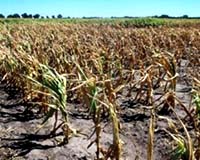 |
Adelaide, Australia (SPX) Oct 26, 2009 Genetic information from an extinct species of bison preserved in permafrost for thousands of years could help improve modern agricultural livestock and breeding programs, according to University of Adelaide researchers. Researchers from the University's Australian Centre for Ancient DNA (ACAD) worked with an international team of genomics researchers to analyse the genetic mutations of an ancient bison, many modern cattle breeds and members of the larger ruminant family tree, including deer, antelopes, and giraffes. Their findings, published in the Proceedings of the National Academy of Sciences, open the way for identifying important mutations in the ancestors of domestic animals, says ACAD Director Professor Alan Cooper. "The entire ancient bison genome was screened using a bovine SNP-chip - which maps changes at 54,000 specific sites across the genome at once. This is the first time such a technique has been used to examine the genetic variation of any extinct species," Professor Cooper says. The bovine SNP-chip was used to scan the genomes of 61 different ruminant species and 48 cattle breeds, to create a detailed evolutionary history for this complex group, which has proven difficult using traditional genetic studies. Study leader Professor Jerry Taylor from Missouri University says: "We were surprised to find that we were able to generate very high quality genotypes for species for which the chip was not designed". By analysing a very large number of mutations across the different genomes, the researchers were able to provide a far more comprehensive picture of the ruminant family tree, as well as revealing the relationships and movements of modern cattle breeds through time. "Understanding how different genes create variation controlling growth efficiency, levels of marbling (intramuscular fat), and disease resistance could have a large economic impact for farmers who raise cattle throughout the world," says Professor Taylor. ACAD post-doctoral researcher Dr Kefei Chen has since used the approach to analyse the genomes of the extinct aurochs, the ancestor of modern cattle, as well as early domestic cattle from China, Russia and Europe as part of a research program funded by the Australian Research Council. Professor Cooper says: "We are using this approach to track genetic changes that took place during domestication, when much of the diversity in ancestral species was lost due to the very strong selection applied by early farmers for a few genetic traits such as docility, rapid growth and birth rates. The lost genetic variation may hold all sorts of valuable information for modern farming, including important adaptations to climate change. Share This Article With Planet Earth
Related Links University of Adelaide Farming Today - Suppliers and Technology
 Protein helps plants survive drought
Protein helps plants survive droughtLa Jolla, Calif. (UPI) Oct 23, 2009 A hormone-sensing protein that helps plants survive dry spells and drought could yield clues to improve crops worldwide, scientists in La Jolla, Calif., said. When a drought-tolerant plant detects dry conditions, a plant protein called PYR1 synthesizes a hormone knows as abscisic acid, scientists at the Scripps Research Institute said. Plants under the influence of the hormone be ... read more |
|
| The content herein, unless otherwise known to be public domain, are Copyright 1995-2009 - SpaceDaily. AFP and UPI Wire Stories are copyright Agence France-Presse and United Press International. ESA Portal Reports are copyright European Space Agency. All NASA sourced material is public domain. Additional copyrights may apply in whole or part to other bona fide parties. Advertising does not imply endorsement,agreement or approval of any opinions, statements or information provided by SpaceDaily on any Web page published or hosted by SpaceDaily. Privacy Statement |